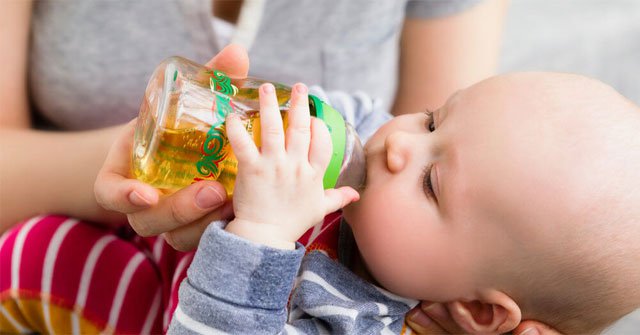Should multivitamins be given to children?
Vitamins are compounds with relatively small molecular weight, but are particularly necessary for the body's metabolism. A full vitamin supplement will help you have a refreshing spirit, boost your immune system and many other benefits. For young children, providing enough vitamins is extremely important. However, is it really necessary to give your baby vitamins and how to provide enough vitamins for your baby?

Does your baby need vitamin supplements?
Many mothers regularly add vitamins and minerals (calcium, iron .) to the baby quite arbitrarily. It means that if you need to supplement or see someone say you need to supplement, immediately give him or her without consulting a doctor to see if he really needs it. Even, some mothers believe that eating only vegetables does not guarantee all necessary vitamins and minerals. Is truth like that?

Vitamins and minerals should not be added arbitrarily because of their reverse side. However, adequate vitamin supplementation for babies is also important so that children can develop both physically and mentally. In this article, Quantum will provide mothers with the information they need to help their loved ones stay healthy.
When do you need vitamin supplements for your baby?
Usually, breastmilk or formula will provide enough vitamins and minerals that your baby needs until about 4 or 6 months except vitamin D. However, your baby should eat healthy, adequate and if she has health problems or vegetarianism, babies may also need vitamin supplements.

See also: What effect does Vitamin A have? Which foods are Vitamin A?
After 4 to 6 months, when your baby starts to eat, your doctor may advise you to supplement your baby with vitamins. Babies who eat a variety of foods often won't need vitamins but doctors can recommend daily vitamin supplements if babies are born prematurely, babies are born underweight, babies have health problems affecting their ability to eat. , babies do not eat a variety of foods, eat only certain foods (eg vegetarian, do not use any dairy products).
According to Health Canada and Today's Parents, healthy, well-developed children do not need multivitamins. In fact, although parents always receive the necessary knowledge and advice about good nutrition for future generations. But it is difficult to ensure a nutritious diet for your baby. Pediatricians often advise parents to supplement their baby with multivitamins in the following cases:
- Children do not eat enough
- Children picky and eat poorly
- Children with chronic diseases such as asthma, have digestive problems
- Children often use fast food
- Children have a special diet, like vegetarian
- Children exercise a lot, play high-intensity sports

A number of multivitamins for baby anorexia
Before deciding to use multivitamins for babies, parents need to know the 6 essential vitamins needed for babies:
- Vitamin A helps children enhance their vision, helps children develop normally, increases the body's immunity, protects and heals the epithelial and bone. Vitamin A deficiency causes night blindness - reduced ability to see when it is dark, if severe deficiency can cause dryness of the cornea and blindness.
- Group B vitamins (B2, B3, B6, B12) have the effect of increasing resistance, maintaining metabolism, contributing to energy production, preventing neurasthenia.
- Vitamin C heals wounds, helps muscles and skin health.
More reference: What is vitamin C deficiency? Symptoms and additional ways

- Vitamin D plays an important role in the formation and help of strong bones and teeth. The Canadian Nutrition Association believes that vitamin D also works against infection, reducing the risk of heart disease, diabetes, sclerosis and even some types of cancer (specifically colon cancer).
Maybe she cares : Sunbathing properly to synthesize Vitamin D effectively
- Calcium helps your baby's bones strong.
- Combined iron with protein plays an important role in making oxygen-transporting hemoglobin. Lack of iron leads to nutritional anemia, not providing enough oxygen for body parts, especially the heart, muscles, and brain.
However, depending on the health status of the child, parents decide what kind of vitamin to supplement.

When is the best day to take multivitamins for your baby?
The best time of day to take vitamin B is after waking up. Taking B vitamins while you are hungry will help absorb vitamins. Vitamin B intake also tends to increase energy. Therefore, drinking too late in the day can cause difficulty sleeping.
The body does not store vitamin C. Therefore, we should take it into the body daily, ideally with small doses throughout the day. Vitamin C should be taken with the same meal and absorbed best. Because vitamin C only lasts a few hours, do not use the entire dose at one time / meal, but divide it into 3 times corresponding to 3 meals a day. In case of stomach pain, you should take vitamin C after meals. Do not take vitamin C too late in the evening, because vitamin C is highly stimulating, making it difficult to sleep.
Because vitamin E is fat soluble, it is easily stored in the body, especially in liver tissue and adipose tissue. Take vitamin E in the morning and drink with fatty foods like milk, nuts, butter, yogurt or drink with meals.
Like vitamin E, vitamin D is also a fat-soluble vitamin that needs to be taken with meals. Vitamin D is best absorbed when you consume it with healthy, fatty foods such as olive oil, avocado or butter. Do not take vitamin D at night or late at night because of the focal effect on sleep.
Note when adding vitamins to your baby

Most experts agree that taking vitamin supplements is quite safe, does not cause serious consequences unless taken too much for a long time.
However, if you want to add vitamins and minerals to your baby, you should pay attention to the following issues:
- Some foods contain a large amount of certain vitamins and minerals: orange, for example, is rich in vitamin C. Sources of vitamins and minerals from foods are more easily absorbed than supplements, so try giving your baby some foods. foods rich in vitamins and minerals that they lack before taking vitamins and minerals for babies.
- Consult your doctor before adding any vitamins to your baby.
- Do not take any vitamins and minerals that exceed the daily necessary dose compared to age, especially vitamins A, D, E and K because they can be harmful. Taking too much vitamin C when you have a cold can cause headaches, diarrhea, pain and nausea.
- See vitamin supplements as a medicine and use caution. Should be given to your baby according to the prescribed dose, do not leave the vitamin where the baby can take and drink freely.
- If your baby is under 4 years old, you should give your baby a vitamin and mineral supplement to prevent risk.
- All vitamin and mineral supplements do not contain 100% of the vitamins and minerals your body needs so you cannot replace food, you still need to maintain a healthy diet for your baby to receive these types Vitamins and minerals are not available in supplemental sources.
- In addition to supplementing, gradually improve your child's eating habits so that you don't have to take vitamins and minerals for a long time.
- When choosing vitamins for your baby, carefully read the labels, some vitamins that contain vitamin A, folic acid and zinc more than the recommended daily intake. The US Food and Drug Administration does not set a general standard for these supplements, so their quality is uneven, and there are very low quality types.
- Oral vitamin supplements often contain caffeine and sugar, so it is not recommended for children.
- Never give your child more than the prescribed amount, even if your baby refuses to eat, only take a supplement for 1 week.
Hopefully, with the above information, mothers will have enough knowledge to supplement vitamins and give baby a smart way. Wish your baby love will always be healthy every day.